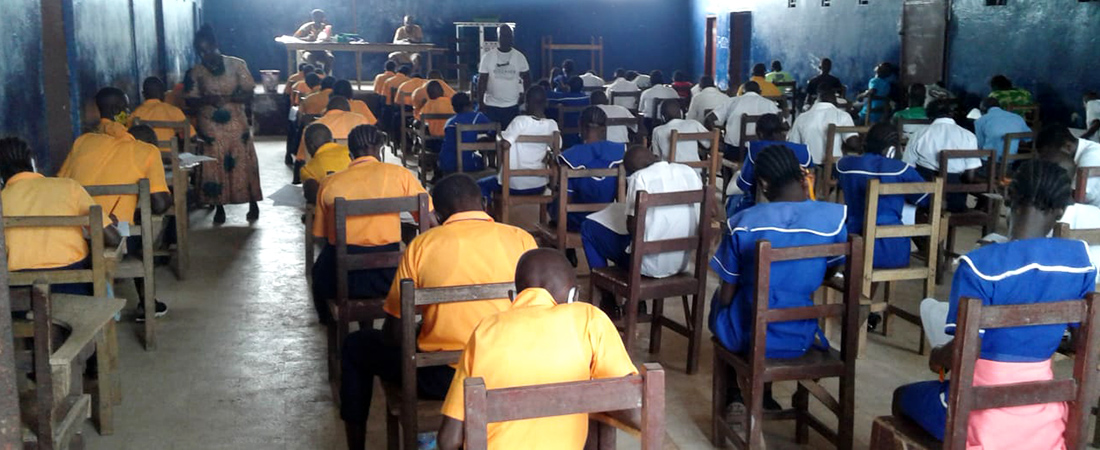Liberia Students Pass National Exam in Record Numbers

In November 2020, students across Liberia overcame great obstacles posed by the coronavirus pandemic to sit for their country’s national education exam. Administered by the West African Examinations Council, the exam sets academic standards for the region’s English-speaking countries, assesses competency in core subject areas by grade, and awards certificates to graduates.
Among the students who sat for the exam this year was a new group: 1,633 formerly out-of-school learners. These students didn’t just show up for the exam—more than half of them passed it in numbers on par with national rates. It marked a huge success for an EDC program designed to help get out-of-school and over-age learners back on track with their education.
Since 2017, EDC has led the USAID Accelerated Quality Education (AQE) for Liberian Children initiative, an accelerated learning program (ALP) that condenses six years of primary education into three years of school. Based on the national curriculum, the program covers four core subjects—math, science, English, and social studies—and is delivered in three levels, each equivalent to two years of primary schooling.
The program is aimed at Liberian children aged 8 to 15 who have dropped out of school due to financial constraints or family obligations, or who never enrolled in school. The program also recruits learners who are over age for their grade. To date, USAID AQE has enabled 62,352 formerly out-of-school and over-age children in six counties to return to the classroom.
“Liberia has a great need for catch-up programming and helping families and children transition back into the formal education system or enter it for the first time,” says EDC international project director Sarah Nogueira Sanca. “We didn’t originally plan for our ALP learners to sit for the WAEC exam, but the opportunity became available and advocates on the team championed learners’ ability to attend.”
Overcoming some of the logistical challenges of having learners take the exam was a community effort. The project paid for students’ exam registration fees. Project staff also collected and entered students’ registration info into the exam registration system. Parents and community members made arrangements to get children to testing sites across the country.
Learners showed that they were interested in taking the exam—and that they were prepared for it, too. Eighty-three percent of eligible ALP learners turned out for the exam, and 61.2 percent of them achieved a passing score or higher.
“This is a huge accomplishment for the team, the Ministry of Education, and especially the learners,” says Nogueira Sanca.
The fact that these learners passed the exam at rates comparable to the conventional school population points to the effect of the AQE program. “This is significant in the context of Liberia,” explains EDC’s Mary Hooker, senior education advisor and technical specialist based in the capital city of Monrovia. “Liberia has gone through two civil wars and is still going through the coronavirus pandemic and an Ebola outbreak. Their education systems have suffered, with teachers fleeing and schools destroyed. We are helping them to rebuild.”
ALP is central to that rebuilding. The ALP curriculum, developed by EDC, was designed to be implemented in public schools alongside conventional learning. This one-school approach made it more convenient for parents of ALP and conventional learning students to send their children to school at the same time and for teachers to manage the curricula and their students. Getting families and communities on board with improved public school learning has been key to the program’s success.
“A quality education is about everyone, every stakeholder seeing a return of investment,” Hooker explains. “And for parents, that return is the benefit of making a decision to send their child to school—particularly in rural areas where a boy child could go to the mines and earn for the family, and a girl child could stay at home and take care of the younger siblings, while the parents work in the farms.”
As the five-year ALP initiative draws to a close, the learners’ success with the national exam gives reason for optimism. Hooker remains hopeful that Liberia can continue to improve its public education system for all students, including those who are out of school.
“Learners have demonstrated that they can read, do math, solve problems, and contribute to their communities,” Hooker reflects. “This is what parents have sacrificed for. It is not just access to schools, but attendance, engagement, retention, persistence, and completion. And that really is the kernel of quality education.”